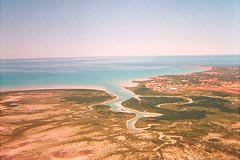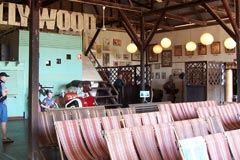Broome
 Broome is Western Australia’s secret getaway, abuntant with colour, right on the Indian Ocean’s doorstep and the gateway to Australia’s last frontier of pristine wilderness – the Kimberley.
Broome is Western Australia’s secret getaway, abuntant with colour, right on the Indian Ocean’s doorstep and the gateway to Australia’s last frontier of pristine wilderness – the Kimberley.
From its rough and tumble, romantic pearling history to the cosmopolitan character of Chinatown, to the turquoise waters, red sandstone cliffs and the endless expanse of white sand at Cable Beach, the colours and moods of Broome will capture your soul. You’ll never want to leave.
Becomming Broome
Broome’s history is defined by the existence of the ‘Pinctada Maxima’ – the world’s largest pearl oyster shell – discovered in Roebuck Bay in 1861. The giant pinctada shells caused a sensation overseas and soon a melting pot of nationalities flocked to the shores of Broome in the hope of making their fortune. Japanese, Malays and Koepangers joined the Aboriginal pearl divers, whilst the Chinese became the shopkeepers in town. Today, remnants of Broome’s exotic past are everywhere. The town’s multicultural society ensures a wonderful array of gourmet tastes, colourful characters and cultural influences.
Pearling still remains a thriving industry and the world famous South Sea pearls feature in Chinatown’s string of pearl galleries. Broome’s climate is also something to boast about with warm sunny days, balmy nights and spectacular storms during the tropical summer season. Not to mention the unforgettable spectacle of sunset on Cable Beach. The coastline of Australia’s North West near Broome is quite breathtaking with notable landmarks including Gantheaume Point with it’s dinosaur footprints and Anastacia’s Pool. The contrast between the tropical blue water and the coloured rocks lining the shore is a great sight.
Accommodation in Broome
- Blue Seas Resort
- Captains By The Bay
- Eco Beach Wilderness Retreat
- Mcalpine House
- Mercure Inn Continental
- Moonlight Bay Suites
- Oaks Broome Hotel
- Ocean Lodge
- Tropicana Inn
Accommodation at Cable Beach
- Cable Beach Club Resort & Spa
- Cable Beachside Villas
- Pearle of Cable Beach
- Pinctada Resort & Spa
- Sanctuary Resort
- Seashells Resort
Broome Attractions
Japanese Cemetery
The Japanese Cemetery at Broome (which is the largest Japanese cemetery in Australia) dates back to the very early pearling days and bears witness to the close ties Japan established with Broome in the early twentieth century.
 The first recorded interment in this cemetery is 1896. Literally hundreds of young Japanese divers died either from the bends (divers paralysis) or from drowning. A large stone obelisk in the cemetery recalls those who were drowned at sea in the 1908 cyclone. The cyclones of 1887 and 1935 each caused the deaths of at least 140 men.
The first recorded interment in this cemetery is 1896. Literally hundreds of young Japanese divers died either from the bends (divers paralysis) or from drowning. A large stone obelisk in the cemetery recalls those who were drowned at sea in the 1908 cyclone. The cyclones of 1887 and 1935 each caused the deaths of at least 140 men.
To give some idea of the scale of deaths resulting from the bends it is worth noting that the cemetery has the graves of 33 men who died of divers paralysis in 1914. There are 707 graves (919 people) with most of them having unusual headstones of coloured beach rocks. The cemetery which has been immaculately restored is on Port Drive on the way out to Cable Beach.
Astro Tours
Blowing your mind is the intention with Astro Tours astronomy nights. Enjoy a delightful guided evening under the stars using powerful telescopes to view the moon, planets, stars and more… Astronomy Experiences – Our 2 hour Astronomy Shows are for Individuals, families, groups, corporates and schools. Phone numbers: 08 9193 5362 or 0417 949 958
Broome Crocodile Park and Pearl Coast Zoo
There are a number of sites of particular interest to the visitor to Broome. Among the more significant are the Broome Crocodile Park on Cable Beach Road near the Cable Beach Resort. The brainchild of well known adventurer and wildlife documentary maker, Malcolm Douglas, it has been established as a research station as well as a place where the public can be educated about the dangers of crocodiles. The crocodiles in the park are predominantly ‘problem’ animals which have been transported from all over northern Western Australia. It is located just around the corner from the Pearl Coast Zoo (a private zoo owned by Lord McAlpine) which, like all good modern zoos, is an environment where the human visitor doesn’t feel as though they are gawping at animals behind steel bars or penned into tiny cages. The zoo’s emphasis is on animals of the Kimberley area.
Broome Historical Museum
Visitors interested in exploring the remnants of the history of the town should start and the Broome Historical Museum in Saville Street at the southern end of Dampier Terrace which has an excellent range of memorabilia relating the town’s pearling past. The Broome Heritage Trail brochure is an excellent guide to some of the town’s more unusual historical attractions.
 Sun Pictures
Sun Pictures
One of the most interesting places to visit is the Sun Pictures building in Carnarvon Street which was built in 1916. Thought to be the oldest open air cinema in the world it is now owned by Lord McAlpine. It showed silent movies until 1933. It still operates with the old canvas deck chairs and is a pleasant and unusual way to spend an evening in Broome. Sun Pictures also runs a modern, indoor cinema in town.
Streeter Jetty
The jetty was named after Edwin William Streeter, the owner of the adjacent land and operator of the business that used the jetty. It was built in the late 1890s and was used to moor pearling luggers. The jetty was thought to have been rebuilt in 1946 and reconstructed in 1966, but deteriorated due to lack of maintenance. Following extensive lobbying in 1998 from the community and vested interest groups, the Shire of Broome convinced Paspaley Pearls Pty Ltd to relinquish ownership and allow control of the jetty to pass to the shire.
Eighty Mile Beach
Eighty Mile Beach the site of the 1887 cyclone, one of the most famous disasters to the Broome pearling fleet, lies some 50 km south of the Sandfire Roadhouse. In 1887 the length of the beach was littered with bodies (140 men were killed by the cyclone) and debris washed up from the battered fleet. Today it is one of the area’s tropical delights. Its blindingly white sands and intense blue seas are quite breathtaking. The beach stretches off to the horizon in both directions and there is an excellent caravan park nestled in behind the sand dunes.

 Towns
Towns Attractions
Attractions Hotels
Hotels

